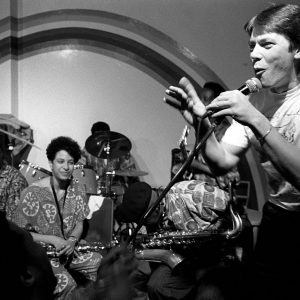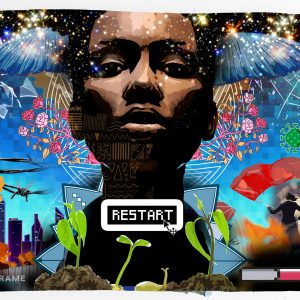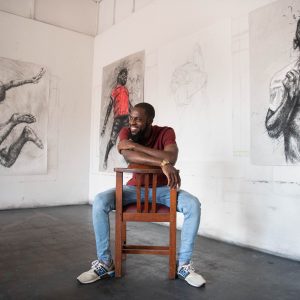How live music is meeting the coronavirus challenge
The Urban Sessions, a series of live streamed music concerts, is exploring a new way of online performance to help musicians hit badly by Covid-19 restrictions.
Author:
12 June 2020

“I’ve never been away from music for that long since I was 14,” says bassist Shane Cooper. “And it all happened so fast: six months of booked work gone in five days. It was like skittles going down… You acknowledge the power of the collective in creating music, but don’t feel how huge it is until it’s gone.”
Says Romy Brauteseth, another bassist: “This happened at the worst time, because of the dry season for live music in December-February. Musicians used up their resources, and just when we thought we’d begin earning, the rug’s been pulled from under us.”
Cooper and Brauteseth are describing the impact of the Covid-19 pandemic on their careers as performers. It’s an experience the whole music community shares, in an era when all the research confirms live performance (and not recordings) as the highest potential earner on the music industry value-chain. Trumpeter Sydney Mavundla knows of despairing colleagues who have sold all their hard-earned equipment simply to pay bills.
Novel model
Now, musicians, promoters and venues are seeking new models to make performing possible again, with online live streaming being prominent in the current climate. But it is not clear how adequate these are, either to pay those bills, or to compensate creatively for an absent audience.
The loss is not simply monetary. “When you’re sitting at home composing,” says Mavundla, “it’s like a craving. You want to hear how it’ll sound; you want audiences to hear it. That’s our gasoline; it’s what we run on.”
Brauteseth adds, “Much as we play music for ourselves and the wonderful moments of bliss when we’re locking into our fellow musicians and speaking a wordless language that says so much, we also play because it brings joy and may make a difference… If it speaks to at least one person in the room, we’re doing something meaningful outside ourselves.”
One possible model for making live music happen again is offered by the Urban Sessions: a series of live streamed ticketed music sessions, whose jazz offering is curated by Aymeric Peguillan (former host of both the Orbit Jazz Club and, before that, neighbourhood venue Peg’s Cosy Corner).
Related article:
The platform is Militia Broadcast, whose founder-CEO since 2010, Eban Olivier, is an award-winning videographer and director, previously part of the founding teams of MTV Base and SkyroomLive.com. The two met through the Orbit’s second anniversary festival, collaborated on the Mzansi Magic television series Downtown Jazz, and discovered shared production values.
“We want to show the creative process of making improvised music as what it is: as people would experience it in a club,” says Peguillan. “It’s based on relationship skills. That’s what we want to show.”
“You don’t need to add bells, whistles and explosions to something that’s beautiful in its own right – it touches souls,” says Olivier. But, he adds “So filming is an intensely sensitive, concentrated emotional process – there’s no going back for a second take.”
Equity, earnings and data
Aesthetics are not all that’s distinctive about the Urban Sessions. The equity business model means both short-term ticket earnings and longer term potential from streams such as video on demand, broadcast licensing and DVD sales will split 50-50 between the production team – “Everybody’s investing their craft,” says Olivier – and the bandleader. But the sessions have a parallel purpose: to gather data about a pressing problem.
“There’s a huge social divide in the online South African music market,” explains Olivier. “Low-income music audiences have no access to data. How do we bridge that?” He says the sessions are already providing useful information, for example about the comparative sales patterns of different genres.
Related article:
Lockdown restrictions – no travel from outside Johannesburg and a distanced stage – meant Peguillan initially targeted a trio format; there will be larger ensembles under Level 3. He sought musicians who’d previously led or expressed interest in trios, aiming to represent jazz diversity.
But sometimes, what he calls that “intensive creative format” posed challenges for players.
Challenge of the new
“It’s tiring for a horn player,” admits Mavundla, who hadn’t previously led a trio or live streamed a show. “Or maybe I was out of condition – another effect of lockdown.” Similarly, when Cooper composes for [his quintet] Mabuta, “I hear five musicians. I’ve always turned down trio gigs. I had to select songs that would work for three of us and keep the energy moving.”
Rehearsal was limited to distant communication, although musicians had the whole afternoon together in the studio pre-broadcast. Brauteseth missed “physically getting together, playing, and then sleeping on it. That’s when we process, and helps us sit together as a unit when we perform.”
Despite enthusiastic silent accolades from the studio crew, all the artists missed a live audience. “Comments or numbers through a screen can never be a substitute for feeling the audience energy in a room,” says Brauteseth.
The artists took different approaches to breaking that Fourth Wall. Mavundla visualised what could be happening in viewers’ homes: “I ended up greeting the people sitting on the red couch – there had to be one of those somewhere!”
Related article:
Singer, composer and trombonist Siya Makuzeni chose to confront the social impact of Covid-19 directly in her session. “People are going through feelings of depression and isolation: division, driven by a constant barrage of fear. I wondered if there wasn’t a more positive, inclusive approach, focusing on what unites us rather than divides.” So her set comforted “it’ll soon be over”, invoked spirituality and used effects pedals to invite a whole Xhosa choir onstage and re-create Thixo Somandla – a sonic subversion of social distance.
“My pedals are another instrument: it was important to include them because of the trio format. They truly represent my sonic sphere and allow me deeper expression…and a world of soundscapes.”
Long-term hope
These artists don’t expect their short-term live stream earnings to do much towards paying the bills. Cooper compares the immediate revenue, at best, to “a gig in [a small neighbourhood jazz club].” They’re slightly more hopeful about a longer revenue tail, and eager to see marketing to reinforce that potential.
However, they value the sessions for the energy they rekindled. “Even if it’s not so lucrative,” says Mavundla, “we have to learn to handle the new normal. When I came off the stage, I felt alive again!” (“So did we,” reflects Peguillan quietly.) “But now”, the trumpeter adds, “it’s gone quiet again. You feel a bit let down.”
Not every South African artist can access even this short injection of hope. A huge social gap – as every musician interviewed pointed out – exists among South African performers as well as audiences. Countless community musicians lack data, equipment and sometimes even electricity and so are denied access to live streaming. “A standard’s being set that many won’t be able to compete with,” warns Brauteseth.
Related article:
What’s more, the Department of Sport, Arts and Culture’s Covid-19 artists’ relief fund, everybody notes, simply did not support how music freelancers work. “There was such a limited application timeframe it became an ‘administration race’ – and they didn’t accept the documents we use, such as screenshots of WhatsApp letters of engagement,” says Cooper. “A relief fund is pertinent,” says Makuzeni, “but one that assists everybody, not just a few, until lockdown lifts.” But to help artists live stream, she says, “we need digital hubs with the necessary resources, open to all artists. We can’t have our means of making a living taken away without solutions.”
Mavundla counts out how many facilities government could access, including “largely unused” SABC studios. “We don’t want handouts; we want to work. Invest: help us create content. There’s always a way of making gigs happen, as these Urban Sessions show. We’ve tried pointing this out … but it’s like speaking to a dead horse.”




